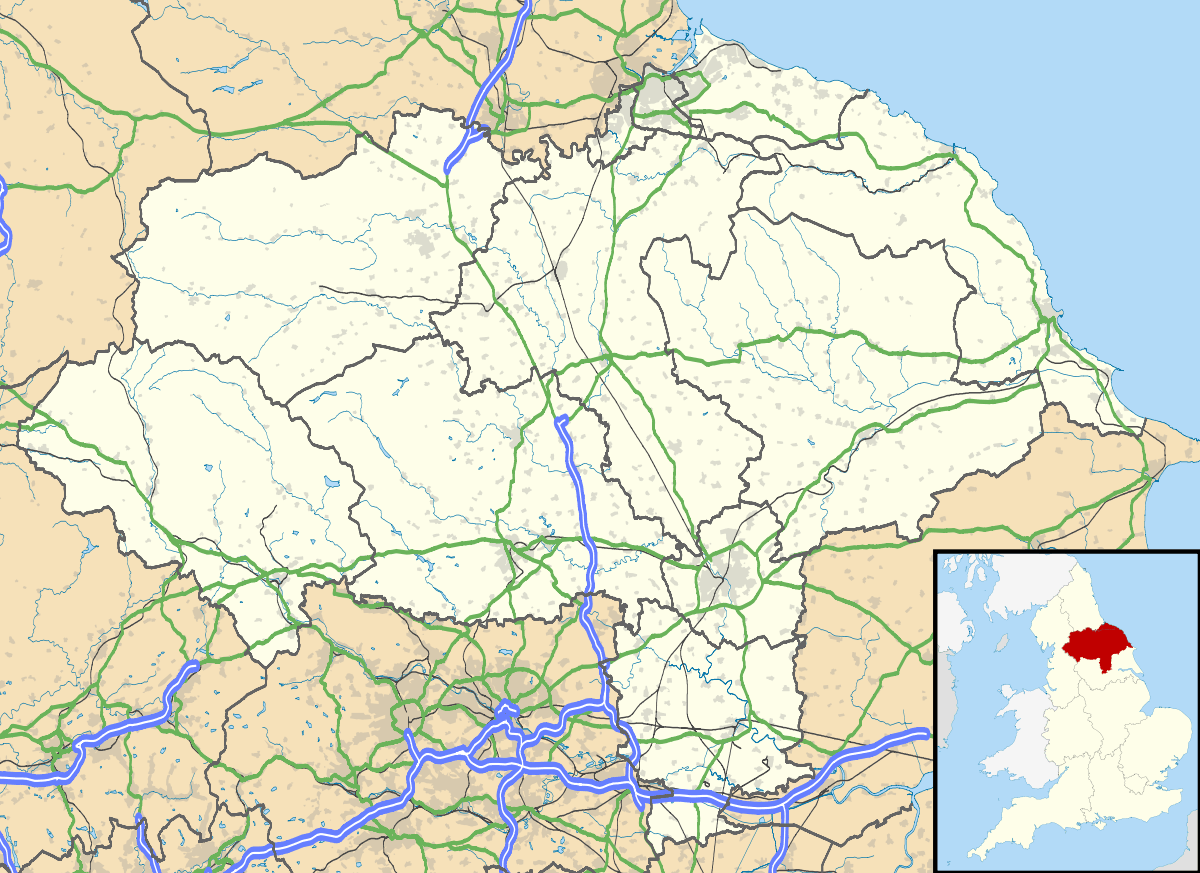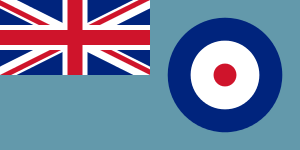RAF Linton-on-Ouse
| RAF Linton-on-Ouse | |||||||||
|---|---|---|---|---|---|---|---|---|---|
| Near Linton-on-Ouse, North Yorkshire in England | |||||||||
 | |||||||||
 EGXU Shown within North Yorkshire | |||||||||
| Coordinates | 54°02′56″N 001°15′10″W / 54.04889°N 1.25278°WCoordinates: 54°02′56″N 001°15′10″W / 54.04889°N 1.25278°W | ||||||||
| Type | Royal Air Force station | ||||||||
| Site information | |||||||||
| Owner | Ministry of Defence | ||||||||
| Operator | Royal Air Force | ||||||||
| Website | RAF Linton-on-Ouse | ||||||||
| Site history | |||||||||
| Built | 1936/7 | ||||||||
| In use | 1937–Present | ||||||||
| Garrison information | |||||||||
| Current commander | Group Captain I Laing MA FRAeS RAF | ||||||||
| Airfield information | |||||||||
| Identifiers | IATA: HRT, ICAO: EGXU, WMO: 03266 | ||||||||
| Elevation | 16 metres (52 ft) AMSL | ||||||||
| |||||||||
RAF Linton-on-Ouse (IATA: HRT, ICAO: EGXU) is a Royal Air Force station at Linton-on-Ouse in North Yorkshire, England, 10 miles north-west of York. It is currently a flying training centre. It has satellite stations at RAF Topcliffe and RAF Dishforth.
Motto
The station motto "A Flumine Impugnamus" translates from the Latin as "From the [mighty] river we strike".[1]
History
RAF Linton-on-Ouse opened on 13 May 1937 as a bomber airfield and was the home of No. 4 Group RAF until 1940.[2] The base's first commander was Wing Commander A D Pryor (1938 Air Force Lists).
When the Second World War began, bombers were launched from Linton to drop propaganda leaflets over Germany[2] and the base was eventually used to launch bombing raids on Norway, The Netherlands, Germany, and Italy.[2] Linton was one of 11 stations allocated to No. 6 Group, Royal Canadian Air Force during the war.
At the end of the war the station was involved with transporting passengers and freight back to the UK.[3] After which it became a Fighter Command station operating the Gloster Meteor, Canadair Sabre and Hawker Hunter until it was closed for maintenance in 1957.[3]
On 9 September 1957,[3] the base was reopened as the home of No. 1 Flying Training School (FTS) and was responsible for training pilots for both the RAF and the Navy.[3]
In 1985, engineering and supply services were contracted out to private firms. The contract for this is currently held by Babcock International.[4][5]
Today, Linton-on-Ouse provides Basic Fast Jet Training (BFJT) for those students selected for the Fast Jet (FJ) stream. On completion of the course, successful students are awarded their Wings and proceed to No 4 FTS, RAF Valley in Wales for their Advanced FJ Training. In addition, the base is used by 642 VGS (Volunteer Gliding Squadron) which teaches Air Cadets to fly the Grob Vigilant aircraft. The station also houses a memorial room (not open to the public) which recounts the history of the base and the units which have been associated with it.[6]
In 1999 the entire NCO married quarter site at Linton Woods were purchased by The Welbeck Estate Group and underwent a major upgrade.[7]
Satellite stations
Linton is responsible for two satellite stations; RAF Topcliffe and RAF Dishforth.
RAF Topcliffe
RAF Topcliffe was opened in 1940 as a bomber station under the control of RAF Bomber Command. In recent years the base has been primarily used for pilot training. It has been used by parachute display teams. The base is currently used by 645 Volunteer Gliding Squadron to training members of the Air Training Corps to fly self-launching gliders.
RAF Dishforth
RAF Dishforth opened in 1936 as a bomber airfield. After the war it began work as a training airfield and was used to convert pilots to the Douglas Dakota transport aircraft. The base is called Dishforth Airfield and currently used as an Army Air Corps helicopter base and as a relief landing ground for Linton on Ouse.
Resident squadrons
_(2).jpg)
The only basic fast-jet training squadron based at RAF Linton-on-Ouse is now 72 Squadron. The squadron holds Reserve status and is designated as 72(R). The squadron operates the Tucano T.1 and include both RAF and RN Fleet Air Arm personnel. Alongside this, Yorkshire Universities Air Squadron relocated to RAF Linton-on-Ouse from the then closing RAF Church Fenton in 2014. YUAS operate the Grob Tutor T1 aircraft.[8]
Also flying at Linton is No 642 Volunteer Gliding Squadron, part of the Air Cadet Organisation.[6]
No 5 Squadron Royal Air Force Police, who form part of 1 Police Wing, RAF Police. Their responsibility is for the policing and security of RAF Linton on Ouse and its satellite stations. RAF Police personnel also deploy on operations throughout the world from this role.
Until January 2012, a second training squadron, 207 Squadron was also resident, but was disbanded as a result of the 2010 Strategic Defence and Security Review on 13 January 2012, 6 months short of the 10th anniversary or the Squadrons' reformation. Some of 207 Squadrons aircraft have been distributed to other units or bases for use or placed in withdrawn storage, but some remain in store on site to be used as reserve aircraft allowing rotation of aircraft to balance out the airframe life and to act as spares sources.
Motor Sport
| Location | Yorkshire, England |
|---|---|
| Opened | 1960 |
| Closed | 1961 |
In the summer of 1960 and 1961, the perimeter track and parts of two runways were used to form the 1.7 mile, Linton-on-Ouse circuit, on what was still an operational RAF base, with the racing organised by the Northern of the British Racing and Sports Car Club. It would appear that only two meetings were held; 10 July 1960 and 9 July 1961.
The 1960 meeting was held in torrential rain and Tony Hodgetts recalls blue sparks coming off his fingers as he cranked the field telephone which was used by the marshals to communicate with race control. The meeting was dominated by Jimmy Blumer in his Cooper Monaco.
The final meeting in 1961 was marred by a fatal accident to a flag marshal. The driver of the Formula Junior car involved was a serving RAF officer and, following the inquest into the death of the marshal, the venue was no longer available. After this sad incident and a near fatality to another flag marshal at Full Sutton Circuit, Tony Hodgetts and Garth Nicholls started a campaign which resulted in flag marshals working face to face instead of back to back, a system which is still in use and is considerably safer.[9]
November 2008 incident
In early November 2008 Wing Commander Paul Gerrard, who is based at the station, was involved in an unusual mid-air rescue. Sixty-five-year-old Jim O'Neill was flying a four-seater Cessna 182 from Scotland to Essex after a family holiday, when he had a stroke which caused temporary blindness. Gerrard was on a training flight, and after being alerted to the situation, located O'Neill's aircraft and over a 45-minute period, guided O'Neill to a safe landing at Linton.[10]
Flying Units
Tucano T.1
Tutor T.1
- Yorkshire Universities Air Squadron
- 9 Air Experience Flight
Vigilant T.1
See also
References
- ↑ Pine, L G (1983). A Dictionary of Mottoes. London: Routledge & Kegan Paul. p. 1. ISBN 0-7100-9339-X.
- 1 2 3 Halpenny, Bruce Barrymore Action Stations: Military Airfields of Yorkshire v. 4 – Page 122
- 1 2 3 4 Halpenny, Bruce Barrymore Action Stations: Military Airfields of Yorkshire v. 4 – Page 130
- ↑ http://www.raf.mod.uk/raflintononouse/aboutus/babcock.cfm
- ↑ http://www.babcockinternational.com/markets/defence/air/
- 1 2 Delve 2006, p. 183.
- ↑ "Relatives of hero pilot visit building named in his honour". www.raf.mod.uk. Retrieved 23 January 2008.
- ↑ "The History of Yorkshire Universities Air Squadron". UAS. Royal Air Force. Retrieved 8 June 2016.
- ↑ Swinger, Peter (2008). Motor Racing Circuits in England : Then & Now. Ian Allan Publishing. ISBN 0 7110 3104 5.
- ↑ Wainwright, Martin (8 November 2008). "Pilot Struck blind in flight shepherded to safe landing by RAF". The Guardian. Retrieved 10 November 2008.
Bibliography
- Delve, Ken. The military airfields of Northern England – County Durham, Cumbria, Isle of Man, Lancashire, Merseyside, Manchester, Northumberland, Tyne & Wear, Yorkshire. Marlborough, Wiltshire, UK: Crowood Press, 2006. ISBN 1-86126-809-2.
External links
| Wikimedia Commons has media related to RAF Linton-on-Ouse. |
- RAF Linton-on-Ouse
- 642 Volunteer Gliding Squadron
- Airport information for EGXU at World Aero Data. Data current as of October 2006.
